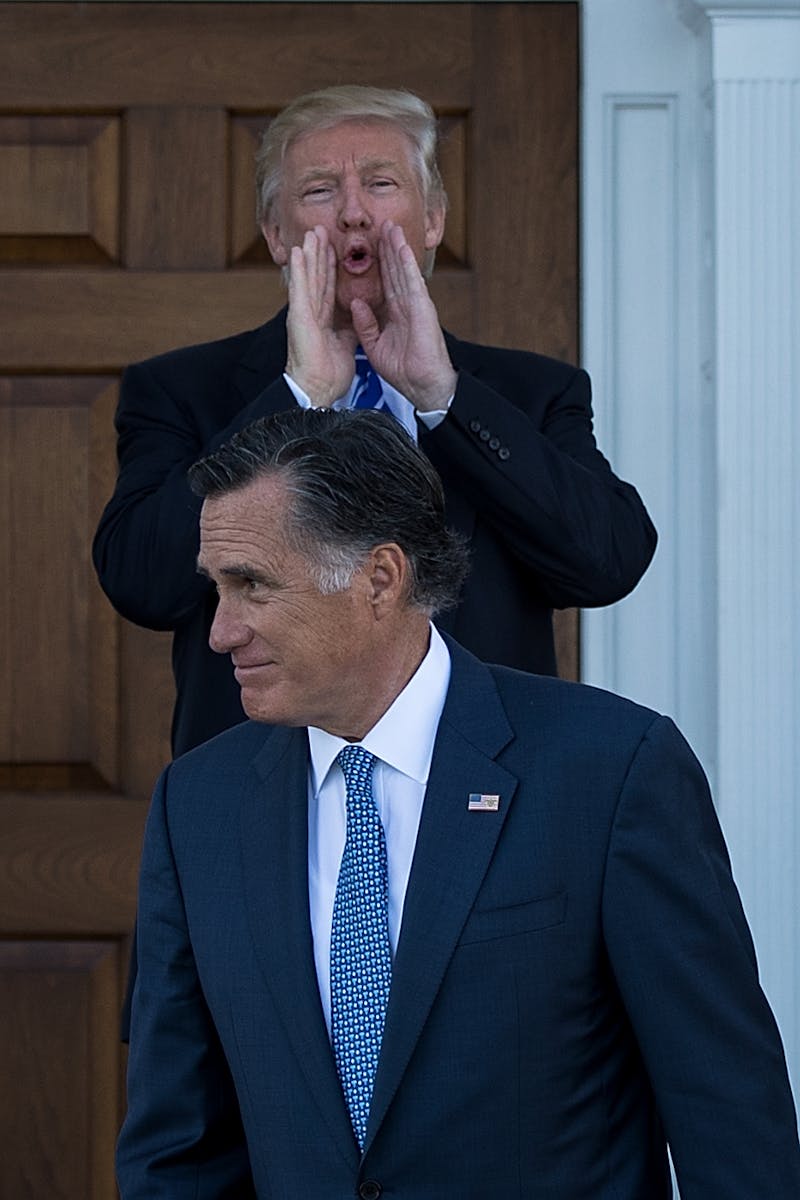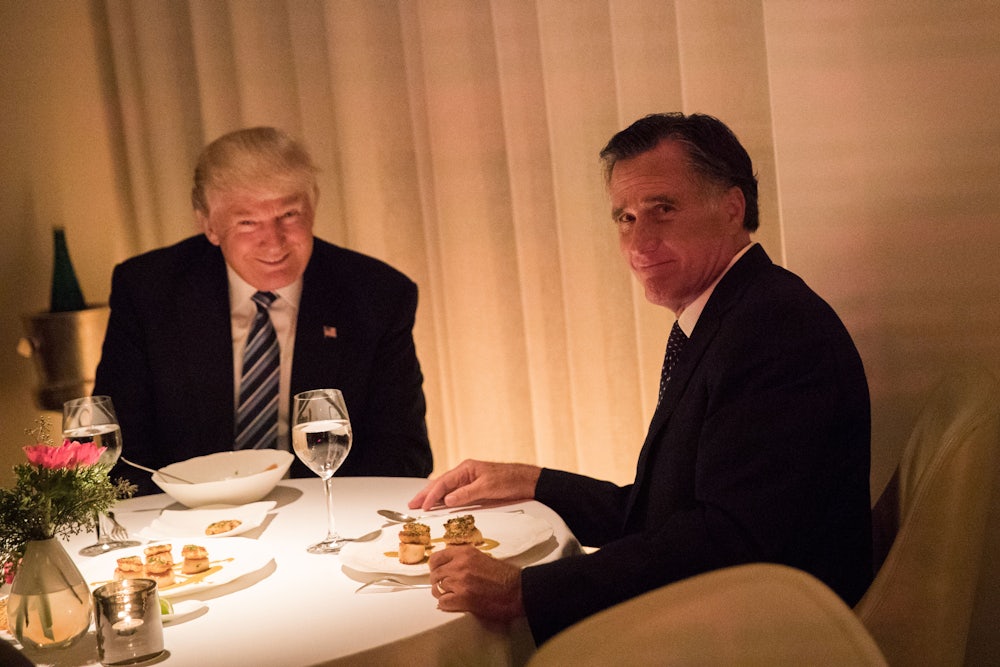We have reached peak Mitt Romney nostalgia. This month, the former Republican nominee is being praised for long ago naming Russia “our number-one geopolitical foe,” a throwaway line that many considered at the time to be a campaign gaffe. The Atlantic’s McKay Coppins reported that Romney is exploring a bid for Senator Orrin Hatch’s Senate seat in Utah. And The Boston Globe came into possession of Romney’s infamous “binders full of women,” which he bragged about—to much hilarity and criticism—during a debate against President Barack Obama.
Romney nostalgia has existed ever since he lost that race, but its broader rise can be traced to January 2015—and attributed to Romney himself. He floated the possibility of running for president again, news that prompted swift laments from conservative columnists like Philip Klein and Jonah Goldberg, with the latter bemoaning “the problem with Romney nostalgia.” Romney stayed on the sidelines as the Republican presidential field ballooned, but the nostalgia only grew as Jeb Bush, the GOP establishment’s great hope, committed one gaffe after another.
Then Donald Trump happened.
“Voters Long for Republican Who Only Wanted to Screw Over 47 Percent of Them,” read a satirical headline from The New Yorker’s Andy Borowitz in early 2016. The nostalgia intensified first among “Never Trump” Republicans, but by summer Democratic officials and strategists were telling the Associated Press that at least Romney “was in it for the right reasons,” “was qualified,” and didn’t “insult his way through his campaigning.” “I don’t think anybody would have truly expected the country to go to hell in a handbasket [under Romney],” Ben LaBolt, Obama’s 2012 campaign press secretary, told the AP.
Now, with America going to hell in a handbasket, Romney nostalgia has hit its apex. This has nothing to do with Romney himself, and everything to do with Trump. Nowhere is this clearer than in the reaction to the unearthed “binders full of women.”
“Hard to believe now, but back then, this was a full-on gaffe,” remarked an NPR host in a segment devoted to the binders. A Vanity Fair columnist was shocked to discover the binders “weren’t just a ham-fisted metaphor”—they “actually led to quite a few hires.” Even the Globe report observed that “if the binders seem vestiges of a political era past, so, too, does Romney’s verbal blunder.” On Twitter, liberal journalists were still LOLing, but this time the joke was on them:
Lib media nostalgia for Romney "Binder of women" would sound more genuine if it came with an apology for soiling a good man's character.
— S.E. Cupp (@secupp) October 15, 2016
In light of Trump’s rampant sexism—his comments about Fox News’ Megyn Kelly having “blood coming out of her wherever,” Hillary Clinton being “such a nasty woman,” Carly Fiorina’s face repelling voters, and his grabbing women “by the pussy”—Romney’s plan for hiring more women, albeit awkwardly expressed, seems downright enlightened.
“Romney’s binders were fodder for humor when we thought we had the space to complain about the manner in which the GOP nominee went about getting women in his circle,” the Massachusetts-based writer behind the @RomneysBinder parody account told me. Or as Jess McIntosh, a democratic strategist and an outspoken Romney critic in 2012, put it to me: “At least Romney pretended he gave a shit.”
But any nostalgia for Romney’s alleged feminism, while understandable, is revisionist history. That our country elected a misogynist to its highest office does not change Romney’s abysmal record on women’s rights—or, for that matter, his cautious praise for Trump’s presidency. Just as morality can’t be measured in the abyss of Trump’s immorality, we can’t lower the bar on other Republicans when it comes to women’s rights.
That thing you’re feeling isn’t Romney nostalgia. It’s Romnesia.
To understand why binder-driven Romney nostalgia is mistaken, it’s important to remember where it came from—specifically, that October night in 2012 when the internet’s collective brain exploded. It was the second presidential debate, held in Hempstead, New York, and the question was about pay equity for women. Obama discussed his vote for the Lilly Ledbetter Fair Pay Act, and Romney talked about his time as governor of Massachusetts. “I went to a number of women’s groups and said, ‘Can you help us find folks?’” Romney said. “And they brought us whole binders full of women.”
Romney was trying to highlight his administration’s recruitment of women in late 2002, but all anyone heard was that awkward phrase. For some, “binders full of women” was merely fodder for a humorous meme, but others responded with a more serious, feminist critique: By literally reducing women to two dimensions, Romney’s binders turned gender equality in the workplace into a superficial game. “Romney may be trying to look like he values diversity,” wrote a Washington Post columnist after the debate. “But in doing so, he makes the promotion of women into leadership roles sound like an exercise in tokenism.”
There was even a backlash to the backlash. “I’m laughing along with everyone else who’s scrolling through images of Ryan Gosling promising, ‘Hey girl, I won’t put you in a binder,’” Ann Friedman wrote in New York magazine at the time. “The thing is, I want to be put in a binder. (And, cough, not just by Ryan Gosling.) I want the top-level men in my profession to be thinking about recruiting people who don’t look like them and share their background.”
That was a minority opinion at the time, but less so now. Binders full of women, be they stored on the internet or the shelf, are seen as a positive—if not ideal—way to formalize the hiring and promotion of more women. “This is not a stupid idea for anyone,” Friedman told me recently. “No matter how it’s used in the context of the debate, it’s still a smart policy idea, a smart management idea.”
Moreover, many of those who mocked or attacked Romney’s binders in 2012 failed to acknowledge—or chose to overlook—their origin. Romney’s administration didn’t create the binders. They were compiled by women and delivered to his transition team in August 2002 by Roni Thaler, then the executive director of the Massachusetts Women’s Political Caucus and of Massachusetts Government Appointments Project (MassGAP), the group which spearheaded the effort.
“We were tired of doing business the way it was currently organized,” Liz Levin told me of the group’s first meeting around her kitchen table. Inspired by the work of a similar group out of California, Levin and this self-selected bipartisan group would go on to solicit resumes from women in seven areas of government, screening them for inclusion in one of two hefty binders intended for the state’s next governor, whoever that would be. (Gender was a heated issue in the governor’s race, with Romney running against Shannon O’Brien, the Democratic state treasurer he’d go on to defeat. Massachusetts still has never elected a woman governor.)

Not only were the binders “very much a production that is built on women’s under-compensated or uncompensated labor,” as Freidman put it, but the backlash to Romney’s remark spurred new efforts to advance women in the workplace. BinderCon, a bi-coastal conference for women and gender variant writers, grew out the private “Binders Full of Women Writers” Facebook group, which has since ballooned to some 40,000 members. “It was always intended as a call to action,” said BinderCon co-founder and freelance writer Lux Alptraum of the community. “We’re actively working to take women and gender variant people out of these lists and into jobs.”
Romney pledged to appoint women to at least half of his cabinet-level posts if elected, but ultimately he didn’t have such a shining record on female hiring. By the time he left office, there were fewer women in cabinet posts than when he took office, according to a study assisted by MassGAP that tracked hires throughout Romney’s tenure. “It always annoys me that they claim the 50 percent thing in the beginning and don’t look at what the data ultimately were [when Romney left office],” said lead author Carol Hardy-Fanta, a senior fellow at UMass Boston’s John W. McCormack Graduate School of Policy and Global Studies and the author of Contested Transformation: Gender, Race, and Political Leadership in 21st Century America. By her own count, 42 percent of cabinet-level hires between January 2002 and July 2004 were women, but as Hardy-Fanta concluded in her report, “subsequent appointments did not reflect a continued commitment to the selection of women for high-level posts.” Between 2004 and 2006, just 25 percent of new appointments were filled by women.
The binders full of women were still a good idea, and remain so—not just because they formalize a process for hiring more women, but because they’re more meritocratic than networking. But binders are not enough, and neither is Romney’s brand of “benevolent sexism,” as BinderCon’s Alptraum described it. It’s worth remembering that during his 2012 presidential campaign, Romney said he wanted to defund Planned Parenthood, endorsed a radical “personhood” initiative, and proposed eliminating funding for Title X family planning, a program enacted with broad bipartisan support under Richard Nixon (one of the chief co-sponsors of the bill was George H.W. Bush, then in Congress). “There are ways of being shitty to women that are less bad than other ways of being shitty to women,” Alptraum said, “but it’s still shitty.”
In a way, the truth about the origins of the binders, and Romney’s hiring practices over time, are a metaphor for Romney nostalgia itself. Since losing to Obama in 2012, Romney has not done much to transform his image. He was initially critical of Trump, calling him “dangerous,” “phony,” and “very, very not smart.” But Romney met with Trump shortly after the November election, and in February said the president has “obviously gotten off to a very strong start.” That’s about it. Otherwise, he continues to tweet photos of his rapidly expanding family.
We have a rosier view of Romney simply because Trump exists, and it may be blinding us to realities of Republicans who, while not bragging about sexually assaulting women, put forth policies that roll back women’s rights. It would be a grave failure of the left to allow Trump’s behavior to move the goalposts on our demands for gender equality in America. To do so would not only cede decades of progress, but it would normalize and enable a tyrant.
Romney isn’t better than we remember. We’ve just seen something much, much worse.
Correction: An earlier version of this article stated that Massachusetts has never had a woman governor. The state has never elected a woman governor, but Jane Swift served as the acting governor from 2001-2003.
